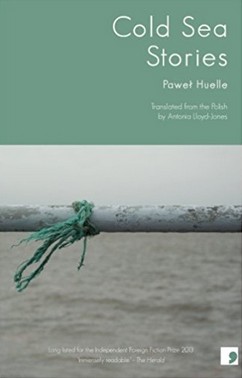|
English Summary/英文概要: A student pedals an old Ukraina bicycle between striking factories, delivering bulletins, in the tumultuous first days of the Solidarity movement... A shepherd watches, unseen, as a strange figure disembarks from a pirate ship anchored in the cove below, to bury a chest on the beach that later proves empty... A prisoner in a Berber dungeon recounts his life s story the failed pursuit of the world s very first language by scrawling in the sand on his cell floor... The characters in Pawel Huelle’s mesmerising stories find themselves, willingly or not, at the heart of epic narratives; legends and histories that stretch far beyond the limits of their own lives. Against the backdrop of the Baltic coast, mythology and meteorology mix with the inexorable tide of political change: Kashubian folklore, Chinese mysticism and mediaeval scholarship butt up against the war in Chechnya, 9-11, and the struggle for Polish independence. Central to Huelle s imagery is the vision of the refugee be it the Chechen woman carrying her newborn child across the Polish border (her face emblazoned on every TV screen), the survivor of the Gulag re-appearing on his friends doorstep, years after being presumed dead, or the stranger who befriends the sole resident of a ghostly Mennonite village in the final days of the Second World War. Each refugee carries a clue, it seems, or is in possession or pursuit of some mysterious text or book, knowing that only it like the Chinese Book of Changes can decode their story. What we do with this text, this clue, Huelle seems to say, is up to us.
Awards/获奖情况: ’Full of powerful imagery.’ --The Financial Times
’[These stories] glow with the warmth of the past that they conjure into life, and with the yearning for an intensity of feeling and experience that does not wane as life passes by.’ --The Independent
’These are complex stories, blending mythology and ancient history with the tide of political change, moving easily between autobiography and invention, reality and fantasy, but they are also immensely readable.’ --The Herald
|
|
|
About the Author/作者介绍: Pawel Huelle spent his early writing career as an employee of the Solidarity Movement’s press office in the late 1980s. He subsequently achieved great critical success (both domestically and in translation) as a writer of novels, short stories and essays, and has been honoured with numerous awards. His first novel, Who Was David Weiser? was described by critics in Poland as ’the book of the decade’, ’a masterpiece’ and ’a literary triumph’ and elicited comparisons to Gunter Grass and Bruno Schulz. Huelle followed this with Moving House and Other Stories, First Love and Other Stories, and then three novels, Mercedes Benz, Castorp and The Last Supper . The novels were published in English translation by Serpent’s Tale, with Mercedes Benz and Castorp both shortlisted for the Independent Foreign Fiction Prize. |

